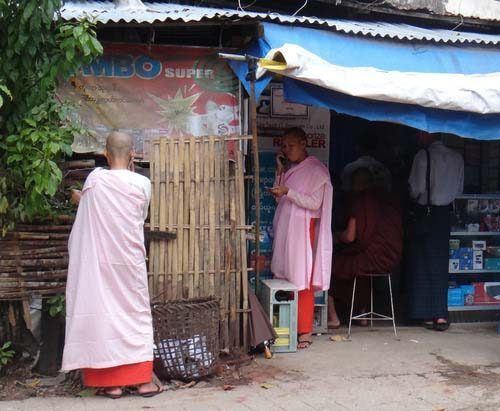
Myanmar is one of the least mobile-connected countries in the world. Ooredoo will be working to change that, after winning an international cellphone license tender late Thursday. But the deal has also increased religious tensions, as Buddhist nationalists call for a boycott of the “Muslim company.”
By Ole Chavannes
The differences in mobile phone usage between Myanmar and Qatar, the home base of telecom provider Ooredoo, are stark. Myanmar is one of the poorest nations in Asia and less than 3 percent of the Burmese have access to a mobile phone.
Mobile and smart phones are available for purchase everywhere, but it is almost impossible to find an affordable SIM card. The ones that are available can be found only on the black market, for up to $300 each. Although that is already much better than a couple of years ago. When mobile services were first made available in 2001, SIM cards cost up to $5,000.
The difficulty in accessing the mobile network is not simply due to poverty. For decades, the repressive military regime was totally fine with common people hardly being able to communicate. This way, only few could know and talk about the atrocities committed by the army, like torturing thousands of political prisoners.
For the past two years, the government has been promoting reform toward a more democratic and open nation. Affordable communication is part of that plan. Recently, the Ministry of Information announced two new licenses for international telecoms. All main global telecoms tried, but only the Norwegian-based Telenor and Qatar’s Ooredoo won the bids.
This is great news for the companies, which can enter such a new demanding market (Burma has over 55 million potential subscribers), and great news for the Burmese, who are finally able to make a clear call for an affordable price. It is also great news for the government, which made lots of money selling the licenses. But not everybody is happy.
‘Say No’
As soon as the news was announced by the Ministry on Thursday, hundreds of comments flood its Facebook page, like “Say No to Ooredoo”. One of the extreme nationalistic Buddhist leaders, monk Ashin Wimala, tells the New York Times: “Did the government have such little choice? Why did they award this to a Muslim company?”.
Together with the newly gained freedom of speech, Burma also experiences a downside: open discrimination toward minorities. Over the last year, Muslims (who account for 3 percent of the population, while over 80 percent of the people here are Buddhist) across the country have been targeted by “Buddhist mobs.”
Over 200 Muslims were killed and some 150,000 people have been forced to flee. Fundamentalist Buddhist monks have called for an economic boycott of Muslim businesses and promoted legislation against “mixed marriages.”
It is hard to predict how many “moderate” Buddhists will agree with this Ooredoo boycott. The Deputy Minister of Information Ye Htut stated, during a meeting against hate speech, that “most Facebook accounts are fake.”
The expectation is to have 80 percent of the population utilizing mobile phones by 2016. Time will tell if most Burmese value religious intolerance more than simply being able to call each other for a fair price, no matter if the company behind that connection is from Qatar.
Ole Chavannes is a journalist based in Yangon who lived in Doha in 2012.
Credit: Photo by Pauline De Senerpont Domis







